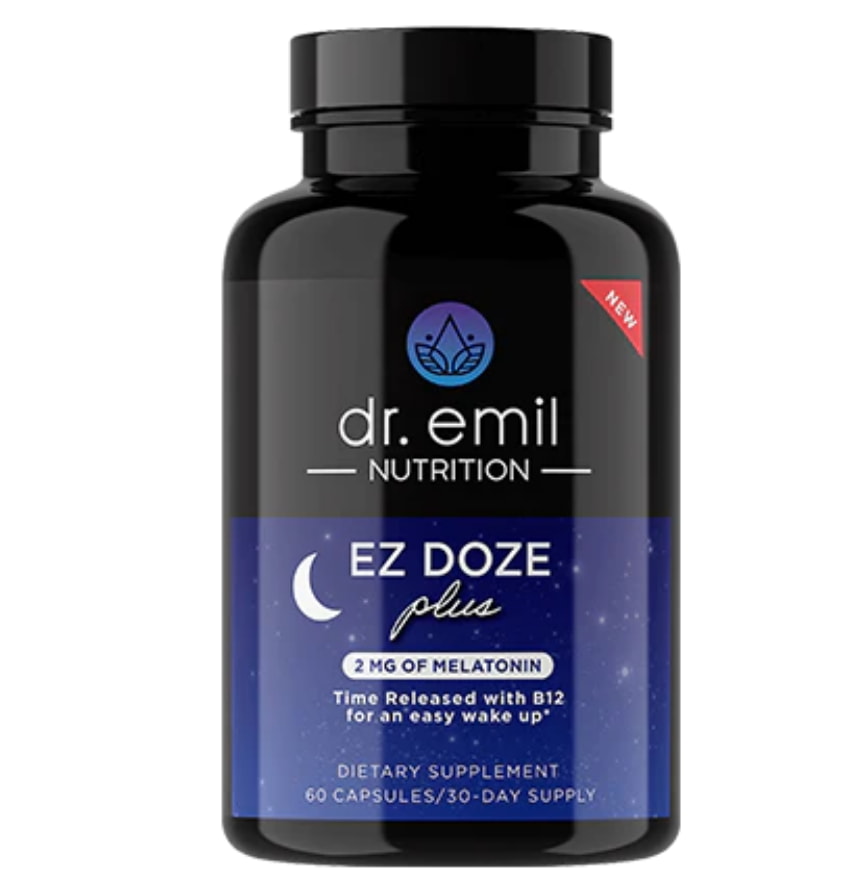If you’re like most Americans, you’ve probably struggled at some point in time to get a good night’s sleep. Our busy lives and the desire to constantly be available for work have made a significant impact on the amount of sleep, and the quality of sleep, we get each night. Over 70 million people in the U.S. report having chronic sleeping disorders, and around 35% of adults aren’t getting enough sleep. This is an increase over the past decade, and most of those respondents reported elevated levels of stress as the likely culprit.
It’s alarming to think that most people are not getting the necessary rest that they need on a nightly basis, but there are things we can do to change this! One is to incorporate mushrooms for sleep or utilize some of the helpful sleep supplements available today. But which ones should you use? We have all those answers and more including:
- Why sleep is so important
- The best mushrooms for sleep you should try
- Other sleep supplements that can help you get a better night’s rest
Why sleep is so important
Sleep is an essential function for our bodies and minds

Next to a healthy diet and exercise, sleep is the third important pillar all humans need to live their best life. When most people think about “being healthy” they immediately turn to their nutrition and exercise routines, and while those are important, sleep is often an afterthought—when in fact it is deeply connected to our physical and mental health. When you don’t sleep well at night, you’re more likely to make poor decisions when it comes to your diet, and potentially less likely to want to move your body physically. Sleep is an essential part of our lives for a variety of reasons:
- It helps your body heal
- It’s good for your heart and brain
- Keeps your immune system functioning
- Boosts your attention span and capacity for learning
- Is important rest time for your body and brain
Everyone knows what it’s like to wake up on their own feeling refreshed from a great night’s sleep. Unfortunately, that doesn’t happen very often and the days we feel well rested seem to be few and far in between. Some of the major culprits that contribute to having trouble falling asleep as well as staying asleep include:
- Stress. One of the leading causes of sleep deprivation is stress, whether that’s from work or personal relationships. There are a lot of strategies out there to better manage stress (yoga, meditation, breathing techniques) but sometimes stress just can’t be avoided, such as getting up to feed a child or having a tight deadline at work. Recognizing where your stress manifests from is the first step to understanding what kinds of techniques will work for you to help lower those levels.
- Stimulating activities. Smart phones have become a part of our daily lives, and we’re looking at them constantly, even before bed. The blue light from computers and phones can disrupt our sleep schedule, causing us to wake up more often during the night. Even though most people know this, it seems that it is a very hard habit to break. Try to limit screens and TV before bed for more restful sleep.
- Pain. Sometimes it’s pain from a chronic condition or muscle/joint pain from a workout session. Waking up in pain or having trouble drifting off due to pain is a common reason some people aren’t getting enough sleep.
- Eating too late. Eating dinner or snacks too late and too close to bedtime can make it more difficult to fall asleep. Avoid large meals or carb-loaded snacks before bed, and limit alcohol and caffeine a few hours before you plan on going to bed. These substances can stay in your system for hours, making it more difficult to sleep the entire night through.
- Lack of exercise. Lots of folks simply do not move around enough and find that they can’t fall asleep. When you’re well-rested, it makes you want to engage more in physical activity, so exercise and sleep are intertwined. Experts recommend trying to do something physical each day. It doesn’t have to be intense all the time, even including a walk in your day can make it a little easier to fall asleep.
- Issues like sleep apnea. Some people have conditions such as sleep apnea and restless legs syndrome that keep them awake at night or contribute to having trouble falling asleep. If you think you’re having issues like this, these conditions can be best addressed by a doctor.
Having a good sleep routine is one of the best ways you can set yourself up for a great night’s sleep. Changing a few lifestyle choices and making it a point to do all that’s in your control to have a good night sleep could be what helps you get more restful sleep. If you’re interested in additional ways you can help your mind and body relax and enjoy better sleep, we have some mushrooms you should be aware of!
These are the top 3 mushrooms for sleep
Yes, there are mushrooms that can help you sleep!

Mushrooms are definitely getting more exposure in Western medicine for the nutrient power houses they are. Eastern medicine and traditional native cultures have used mushrooms for hundreds of years thanks to all the healthy properties they have and the benefits they offer to us. Many mushrooms are adaptogens, which are herbs, roots, and plants that when taken consistently can gently help our bodies regulate stress better. There are also a variety of ways in which you take mushrooms—you don’t have to eat them whole if the texture bothers you!
Instead you can take mushrooms for sleep in a few different ways:
- As a tincture
- Powder
- Capsules/tablets
- Gummies
But what mushrooms should you focus on? If you’re ready to incorporate mushrooms into your sleep routine, you have a few you should definitely start taking.
Reishi
Reishi mushrooms are native to Asia, and they have been used in Eastern medicine for centuries. Their adaptogenetic properties are well known in the herbalist community, and they’re also one of the top mushrooms you should include in your sleep routine. This small but powerful fungi has over 400 different nutrients including beta glucans, which can lower blood sugar levels and reduce your heart disease risk, as well as plenty of antioxidants that can help prevent cell damage and disease.
These mushrooms can also:
- Boost your immune system. Reishi mushrooms have a positive effect on white blood cells, which can help lower your chances of getting sick and help out your immune system in the long run. Taken regularly they can increase the amount of white blood cells in your body.
- Help with fatigue. The antioxidants in reishi mushrooms can help protect the body from free radicals, as well as keep the immune system functioning at its peak.
- Have anti-cancer uses. The beta glucans that help keep blood sugar levels in check may also help reduce tumor growth due to their positive effect on white blood cells.
How does it help with sleep?
Because reishi mushrooms are so good at fighting fatigue and helping the body feel more calm overall, they are a wonderful addition to your sleep routine. Adaptogens like reishi mushrooms help the body respond better to stress, and promote more feelings of calmness. So if worrying about falling asleep stresses you out, reishi mushrooms should be your go-to mushroom to help you get better sleep.
Lion’s mane

These mushrooms are one of the most distinct mushrooms around, and they’re named after their resemblance to a lion’s mane. Lion’s mane mushrooms, like reishi, have been used in their native Asia for years, and offer a whole slew of benefits to us. Because of the well-known advantages of taking them, lion’s mane mushrooms may be the easiest ones to find, especially if you’re interested in cooking them.
The benefits of lion’s mane are:
- Fight inflammation. Chronic diseases like diabetes and heart conditions are often the result of unchecked inflammation in the body. Lion’s mane can help with this as it has the antioxidants necessary to fight the damage done by free radicals.
- Help with focus. Consistently taking lion’s mane can help you have better focus throughout the day. Lots of people who take it daily notice that they have better clarity, and can get things done. The mushroom is a good source of hericenones and erinacenes that help promote the growth of brain cells.
- Nerve regeneration in the brain. Speaking of its effects on the brain, lion’s mane may also help with nerve regeneration in the brain, since they have compounds that can cross the blood-brain barrier.
How does it help with sleep?
Lion’s mane helps you stay on task and focus during the day, helping you get done what you need to. This can prevent worrying at the end of the day about all the things that might be piling up on your to-do list. Restlessness before bed or after waking up during the night can also contribute to difficulty sleeping, which is why lots of folks like to take their lion’s mane before bed.
- Pick up lion’s mane from Dr. Emil Nutrition!
Cordyceps
Another mushroom that you can try if you’re interested in better sleep are cordyceps. Like the other two mushrooms, this fungus has been used in Asia for centuries. You’ll find this type of mushroom most commonly in tincture or capsule form, and the offer a variety benefits:
- Promote heart health. Cordyceps contain adenosine, which offers protection for the heart by reducing oxidative stress and preventing an enlarged heart.
- Increase energy. The specific adenosine in cordyceps may increase the adenosine triphosphate (ATP) molecule in our bodies, which provides energy for our muscles to move. This may be able to assist the body make more oxygen at a quicker pace so we have the energy we need to get through the day.
- Reduce inflammation. Cordyceps may be able to suppress the proteins that cause inflammation in the first place, helping people reduce their risks of diabetes and cardiovascular disease.
How does it help with sleep?
Thanks to its effects on ATP, cordyceps help us to stay more active during the day time, and be ready for bed in the evening. Lots of folks deal with not being able to quiet their mind or their body in preparation for rest, so cordyceps might be a great solution to this sleep issue.
Other supplements you can incorporate for better sleep
Dr. Emil has lots of options to help you sleep

If you’re interested in a supplement that offers you all kinds of helpful, safe, and soothing sleep aides, look no further than Dr. Emil’s EZ Doze Plus. This non-habit forming sleep aid has calming ingredients designed to help you drift off to sleep, and wake up feeling refreshed!
Ingredients include:
- Melatonin
- Vitamin B6
- GABA
- St. John’s Wort
- L-Theanine
- Magnesium
- Valerian
- And more!
Which mushrooms for sleep will you start using tonite?
You have lots of options when it comes to getting more restful sleep. First make sure to evaluate or implement a sleep schedule that works for you. Make some adjustments to your current routine and see if you start sleeping better. You can also incorporate some mushrooms that can assist with better sleep, or consider picking up some of Dr. Emil’s highly-rated sleep supplements that are safely designed to help you fall asleep and stay asleep throughout the night.






